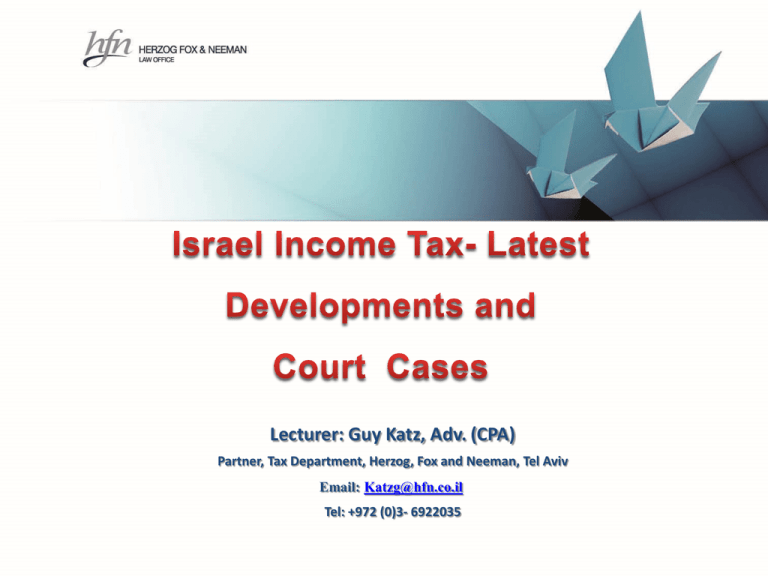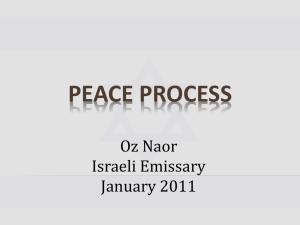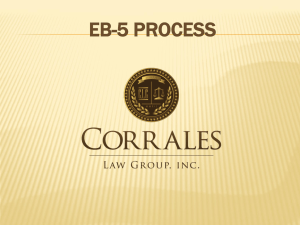Guy Katz, Herzog Fox & Neeman, Israel Income Tax
advertisement

Lecturer: Guy Katz, Adv. (CPA) Partner, Tax Department, Herzog, Fox and Neeman, Tel Aviv Email: Katzg@hfn.co.il Tel: +972 (0)3- 6922035 Table of Contents Exchange of Information Agreement And FATCA How To Be Prepared Recent cases Exchange of Information Exchange of Information Through Double Taxation Treaties International Tax Information Exchange Agreement Proposed Legislation Regarding Exchange of Information FATCA Exchange of Information Double Taxation Treaties International Tax Information Exchange Agreements Proposed Legislation FATCA • In non-criminal matters, under current Israeli domestic law, the Israeli Tax Authority is generally allowed to provide information to foreign tax authorities only pursuant to the provisions of double taxation treaties. • The scope of exchange of information depends on the terms and limitations of each double taxation treaty. • Israel has an exchange of information provision included in each of its double taxation treaties (approximately 50 treaties). Exchange of Information – United States Treaty Double Taxation Treaties International Tax Information Exchange Agreements Proposed Legislation FATCA Models for Exchange of Information • Automatic Exchange of Information Double Taxation Treaties - OECD Treaty Model for exchange of Information of February 2014. International Tax Information Exchange Agreements Proposed Legislation FATCA - On 29 October 2014, 51 jurisdictions signed a multilateral component authority agreement to automatically exchange information based on Article 6 of the Multilateral Convention. - The agreement specifies the details as to what information will be exchanged and when, as set out in the Standards for Automatic Exchange of Financial Information in Tax Matters Exchange of Information – Proposed Legislation • On January 29, 2014, the Government of Israel proposed legislation which would allow for the exchange of information in accordance with international information exchange agreements. • According to the proposed legislation, the Israeli Tax Authority will be able to exchange information with other tax authorities, subject to the exceptions set out in the international information exchange agreements and the following terms: Double Taxation Treaties International Tax Information Exchange Agreements – – Proposed Legislation FATCA – The information is relevant to the enforcement of the foreign domestic tax law of the requesting party, which the Israel Tax Authority could use for the enforcement of its own domestic tax law. The other contracting country is required to protect the information under confidentiality obligations set out in the International Treaty. The other contracting country will use the information only for the enforcement of its domestic tax law, and as such, will not provide the information to: (i) another party in the country when such information is not for the purpose of the enforcement of its tax laws; and (ii) another country for any purpose. This new proposed legislation will enable Israel to sign bilateral conventions for the automatic exchange of information Exchange of Information – Proposed Legislation Double Taxation Treaties International Tax Information Exchange Agreements Proposed Legislation FATCA • The new proposed legislation, in its current form would enable a wide exchange of information with regard to tax matters . • According to the current proposed legislation, the authorized person has the right to provide and exchange information with other tax authorities even based on his own initiative. FATCA 2014- Step By Step Double Taxation Treaties International Tax Information Exchange Agreements March 2014 April • The draft directive published by the Supervisor of Banks • Memorandum for the introduction of legislation 2014 Proposed Legislation June 2014 FATCA • Signing the Intergovernmental Agreement FATCA- Supervisor of Banks Double Taxation Treaties International Tax Information Exchange Agreements Proposed Legislation FATCA • In March 2014, the Supervisor of Banks published a draft directive for banking corporations. • The draft directive instructs the corporations to determine the policy and procedure in order to implement the legislation commonly known as the Foreign Account Tax Compliance Act (“FATCA”) . • The Supervisor of Banks states that the refusal to provide services to a consumer who does not cooperate, shall be considered as reasonable refusal according to the Banking Law (Customer Service) 1981 . FATCA- Memorandum for the introduction of legislation Double Taxation Treaties International Tax Information Exchange Agreements • In April, 2014, the Ministry of Finance published a memorandum of legislation (one step before proposed legislation) in accordance to the FATCA. • The Memorandum for the introduction of legislation is aimed at authorizing the Minister of Finance to issue regulations which will facilitate identifying the owners of accounts in Israeli financial institutions (“FFI”) in order that Israel will be in a position to implement the Intergovernmental Agreement (“IGA”). • The Minister of Finance has not yet issued the proposed regulations. Proposed Legislation FATCA FATCA- Signing the Inter-Governmental Agreement Double Taxation Treaties International Tax Information Exchange Agreements Proposed Legislation FATCA • On June 30, 2014, the State of Israel and the United States of America signed an IGA in respect of the FATCA. • This IGA is what is referred to as a "Model 1" IGA: compliance with FATCA is through local government. • US FFI will be obligated to identify accounts held by Israeli residents and submit that information to the US Government, which will then submit that information to the Israeli Government. FATCA- Signing the Inter-Governmental Agreement Double Taxation Treaties International Tax Information Exchange Agreements Proposed Legislation FATCA • The IGA is also aimed at enabling the Israeli FFI, to which the FATCA provisions apply, to comply with FATCA by providing information to an Israeli government agency, instead of to the Internal Revenue Service ("IRS"). • Israeli FFIs will not need to enter into an agreement with the IRS in order to avoid the status of "Non-participating FFIs". • Israeli FFIs that would have otherwise been subject to FATCA reporting are defined as "Reporting Israeli FFIs". Reporting Israeli FFIs are not considered Non-participating FFIs and are therefore not subject to FATCA withholding, unless they are determined to be in significant non-compliance with their obligations under the IGA. How To Be Prepared Voluntary Disclosure Program Settlements for Israeli Residents Trusts Settlements for Foreign Residents Settlors The Voluntary Disclosure Program The Voluntary Disclosure Program • On September 7, 2014, the Israeli Tax Authority ("ITA") announced a new voluntary disclosure procedure (“VDP”). Settlements for Israeli Residents Trusts • Full payment of tax 2004- 2013 Settlements for Foreign Residents Settlors • Tax on principal- ? Tax Settlements for Israeli Residents Trusts The Voluntary Disclosure Program Settlements for Israeli Residents Trusts Settlements for Foreign Residents Settlors • Full payment of tax 2003 - 2014 • 10% tax on principal. Tax Settlements for Foreign Residents Settlors Trust Type Taxable Income Tax on Capital Trusts The Voluntary Disclosure Program Settlements for Israeli Residents Trusts Settlements for foreign Residents Settlors Aspects Family Trust, and the settlor is alive 1/3 of the applicable tax during 3% of the trust the Determining Period capital Family Trust and the settlor is 1/2 of the applicable tax during no longer alive the Determining Period 4% of the trust capital Trusts in which the beneficiaries have apparent potential ability to influence the trust 2/3 of the applicable tax during the Determining Period 6% of the trust capital The beneficiaries had no influence on the trust 0% of the applicable tax 0% of the trust capital Israeli beneficiary trust with no family relationship Subject to the discretion of the assessing officer Recent Court Cases and Proposed Legislation Residency (Individual) Residency Management and control Recent Court Cases -Residency Residency (Individual) Management and Control * Splitting the Family Unit Kfar Saba Tax Assessor vs. Michael Sapir, Civil Appeal 4862/13 Factual Background: - Michael Sapir (“Sapir”), lived with his family in Singapore from 1994 to 1998. They returned to Israel, but in June 2001, Sapir left again for Singapore by himself. - Sapir spent the following days: In 2001: 224, 2002-2005: minimum of 644 days (he met conditions for the “presence test” terms ). - Sapir submitted annual reports for 2001-2005, and did not include his income in Singapore. - The Kfar Saba tax assessor argued that the income in Singapore shall be considered as income of an Israeli resident and thus taxable in Israel. Recent Court Cases- Residency Residency (Individual) Management and Control * Splitting the Family Unit Kfar Saba Tax Assessor vs. Michael Sapir, Civil Appeal 4862/13 Tel Aviv District Court: - Judge Altuvia Magen ruled that Sapir was an Israeli resident during 2001, according to the significant amount of days that he spent in Israel. - During 2002-2005, according to the test of the “center of life”, Sapir is considered as a foreign resident. - Magen Altuvia determined that the family’s place of residence is a persuasive indicator of the taxpayer's place of residence but not a conclusive one. In this case, the taxpayer proved that most of his connections are with Singapore and accordingly, he should be recognized as a foreign resident. The Tax Authority appealed to the Supreme Court Recent Court Cases- Residency Residency (Individual) Management and Control * Splitting the Family Unit Kfar Saba Tax Assessor vs. Michael Sapir, Civil Appeal 4862/13 Supreme Court: - Justices Esther Hayut, Hanan Meltzer and Uzi Fogelman rejected the Tax Authority’s appeal, and determined that he was not an Israeli resident. - Justice Hayut clarified that even though the center of life of a person is usually where his family lives, there are families that live differently and accordingly, it is not the only indictor for determining residency. Recent Court Cases- Residency Residency (Individual) Management and Control * The Presence Test and “Center of Life” test Avraham Cohen Vs. Tel Aviv 3 Tax Assessor , Civil Appeal 2704/13 Factual Background: - Avraham Cohen (“A.K”) argued that he was a resident of Romania during the years 2005-2006. In fact, he had permanent residence in Israel, his family lived in Israel, and he owned an active company in Israel. He also had financial interests in Romania. - The Tax assessor determined that he was an Israeli resident during the relevant period according to the “presence test” and also according to the indicators of his center of life. The factual background is different from the Sapir Case. Recent Court Cases- Residency Residency (Individual) Management and Control * The Presence Test and the “Center of Life” Avraham Cohen Vs. Tel Aviv 3 Tax Assessor , Civil Appeal 2704/13 District Court: - Judge Yona Atadgi ruled that according to the “presence test” and the “center of life” examination, AK was an Israeli Resident. AK had failed to prove differently, and also did not present important witnesses which could support his subjective intentions . Supreme court: - The 3 judges rejected the appeal. They ruled that the dispute revolves around facts and the reliability of the taxpayer, and in which the Supreme court cannot interfere. - Judge Yitzchak Amit clarified that the refusal of AK to cooperate with the Tax authorities , and the fact that he did not present witnesses are enough in order to determine that his center of life was not in Israel. Recent Court Cases- Residency Residency (Individual) Management and Control * Relocation Zur Vs. Haifa Tax Assessor , Tax Appeal 19466-01-12 Factual background: - The appellant (“Zur“) relocated to Hong Kong from January 2006 to August 2008, with her family. Her husband left his position in Israel and the children went to school in Hong Kong. - Her Israeli employer withheld taxes for this period of time, since he assumed that she was an Israeli resident. Zur requested a tax refund which the tax assessor refused, and determined that she was an Israeli resident. Recent Court Cases- Residency Residency (Individual) Management and Control * Relocation Zur Vs. Haifa Tax Assessor , Tax Appeal 19466-01-12 District Court: - Judge Ron Sokol ruled that Zur was a resident of Hong Kong in the relevant period of time, since she had transferred her center of life. - Even though Zur met the condition of the second “presence test” (more than 425 days from 2004 to 2006 ) for 2006, the judge clarified that when a taxpayer transfers his center of life during the relevant time period, the examination is different. If it is proved that the center of life had been transferred during the relevant time period, the days prior to the date of transfer would not have an influence on determining the center of life location. This is an important ruling in the matter of classification of tax payers who relocate for a short period of time. This case can support a different position from the position of the ITA which is presented in circular 1/2012 and determines that relocation for less than 3 years cannot change a residency Recent Court Cases- Residency Residency (Individual) Management and Control * Relocation Zur Vs. Haifa Tax Assessor , Tax Appeal 19466-01-12 The influence of amendment 168 to the Ordinance Definition of foreign resident: 1 2 183 days 183 days 3 4 center of life center of life Residency (Individual) Management and Control Proposed Legislation- reporting obligation (Residency) • The Economic Efficiency Law ( Legislative Amendments for Implementing the Economic Plan for 2015)5774- 2014 : - - Applying the reporting obligation on an individual who meets the “presence test” conditions, according to the definition in section 1 (a)(2) to the Ordinance (425/183 days) and the presumption, can be refuted according to his arguments. Exceptions: 1. Income Tax Regulations(designation of individuals who shall be deemed Israeli residents and designation of individuals who shall not be deemed Israeli residents ) 5766-2006 2. Foreign worker ( as defined in section 48A to the Ordinance) Recent Court Cases- Management and Control Residency (Individual) Management and Control Niago Vs. Kfar Saba Tax Assessor, Civil Appeal 3102/12 Factual Background: - The Appellants worked in the Textile area and held 2 companies, one in Israel which worked with Israeli manufacturers and one in the Bahamas, which provided services to foreign residents. - The Bahamas company distributed dividends to the appellants. - On the one hand, the Tax assessor claimed that the dividend is taxable in Israel since the Bahamas company is an Israeli resident according to the control and management test. - On the other hand, the tax assessee claimed that the company had a foreign business activity, foreign residents directors, and that the board meetings were held outside of Israel and thus the company was controlled and managed out of Israel. Recent Court Cases- Management and Control Residency (Individual) Management and Control Niago Vs. Kfar Saba Tax Assessor, Civil Appeal 3102/12 District Court: - Judge Magen Altuvia rejected the appeal. He ruled that the strategic decisions were made in Israel by the appellants or by their sons in Israel and that the platform that they had outside of Israel did not have a substantive effect on their business activity. Supreme court: - The 3 judges rejected the appeal. Judge Miriam Naor ruled that the ruling of the District Court is based upon “solid ground” and the conclusion that the management and control of the company were performed in Israel is well based. Recent Court Cases- Management and Control Residency (Individual) Management and Control Yanko weiss Vs. Holon Tax Assessor, Tax Appeal 1090-06 Factual Background - The Weiss and the Yanko which are Israeli residents couples, held a company that was registered in Israel. After a while it was also registered first in Luxemburg and After in Belgium. - This company had a business activity within and outside of Israel. The company held an Israeli subsidiary. - The company sold its subsidiary and did not report on the capital gain in its tax report. The tax assessor claimed that the company is an Israeli resident and assessed its capital gain . Recent Court Cases- Management and Control Residency (Individual) Management and Control Yanko weiss Vs. Holon Tax Assessor, Tax Appeal 1090-06 District court: - Judge Magen Altuvia rejected the appeal. - He examined the Management and control test and ruled that even though the company had a real business activity in Belgium, Mr. Yanko and Mr. Weiss controlled the company from Israel and they were the actual managers and accordingly, the company is an Israeli resident. - Judge Altuvia also clarified that the electronics abilities which exist in this decade, and enable contact to be made even at a distance of thousands of kilometers, increases the burden of proof for Israeli residents who claim that the management is outside of Israel. Proposed Legislation (Residency) Residency (Individual) Management and Control • The Economic Efficiency Law ( Legislative Amendments for Implementing the Economic Plan for 2015)5774- 2014 : - Applying the reporting obligation on an Israeli resident beneficiary, from the age of 25, and only if the total of the trust’s assets is not less than NIS 100,000 . • Trust’s Assets- including cash, deposits, securities and real estate in Israel or outside of Israel. - Cancelation of section 14(d) to the Ordinance • The possibility to extend the periods of exemptions for an immigrant or senior resident who has made a significant investment in Israel and can contribute to the national objectives of the State of Israel.








